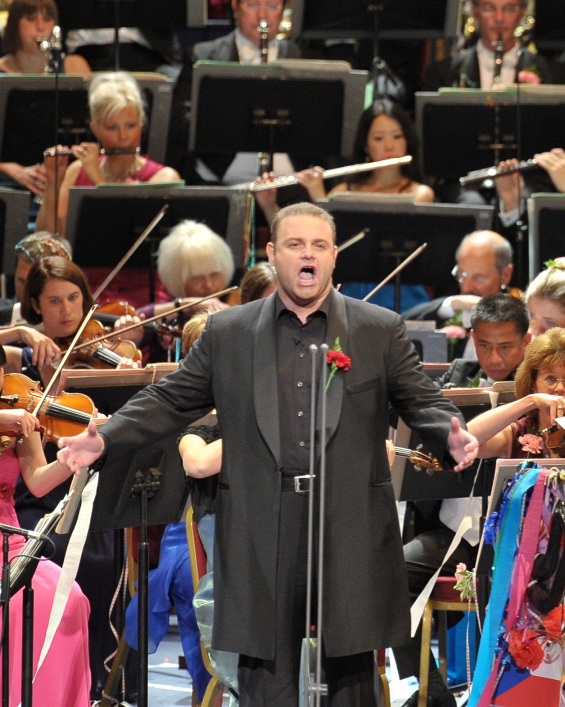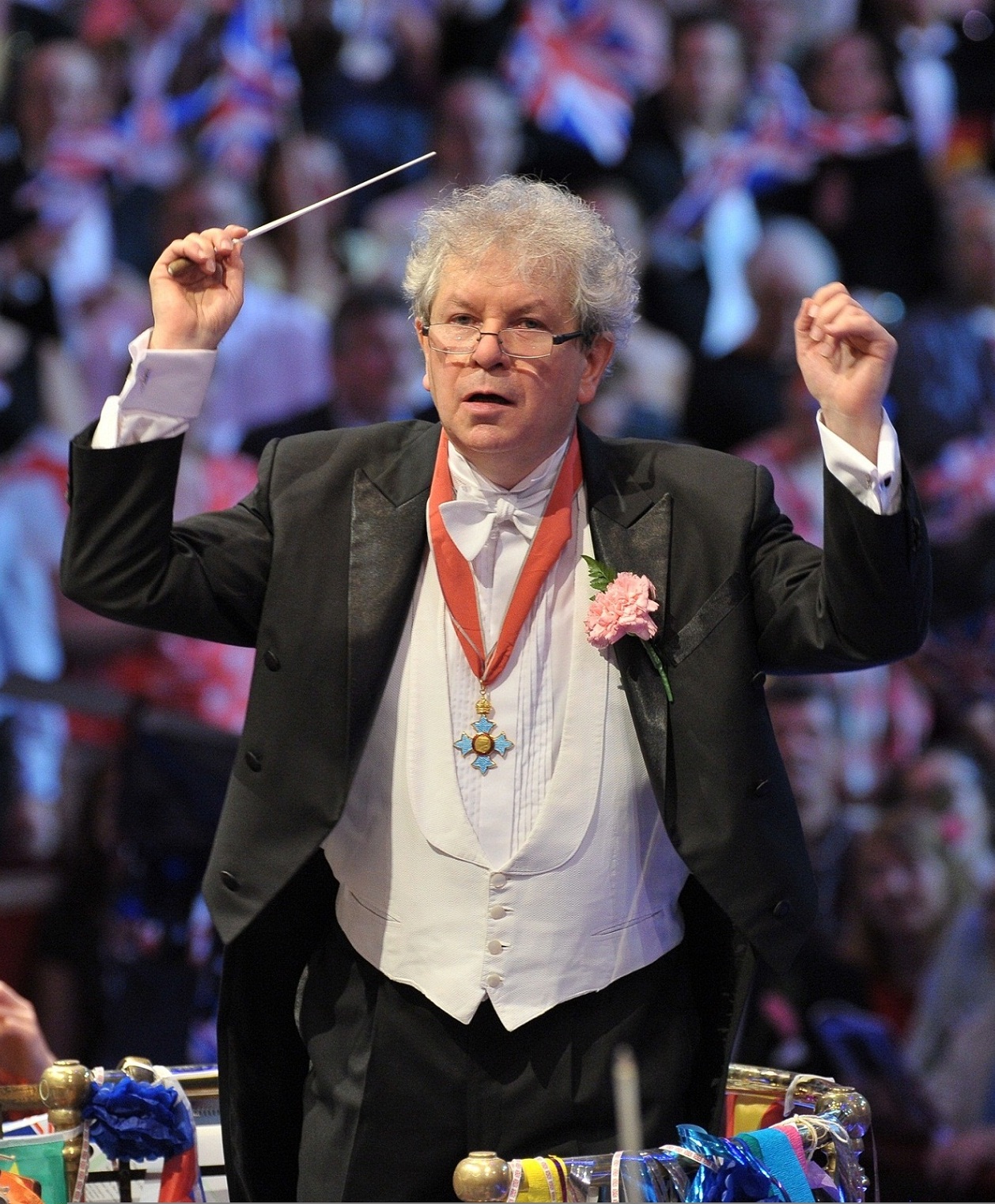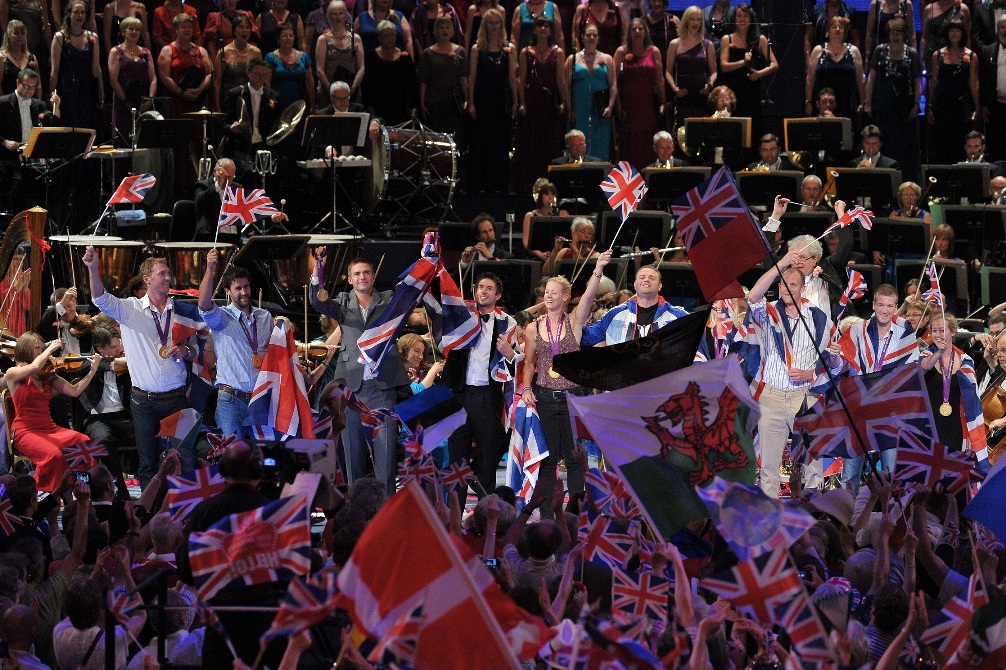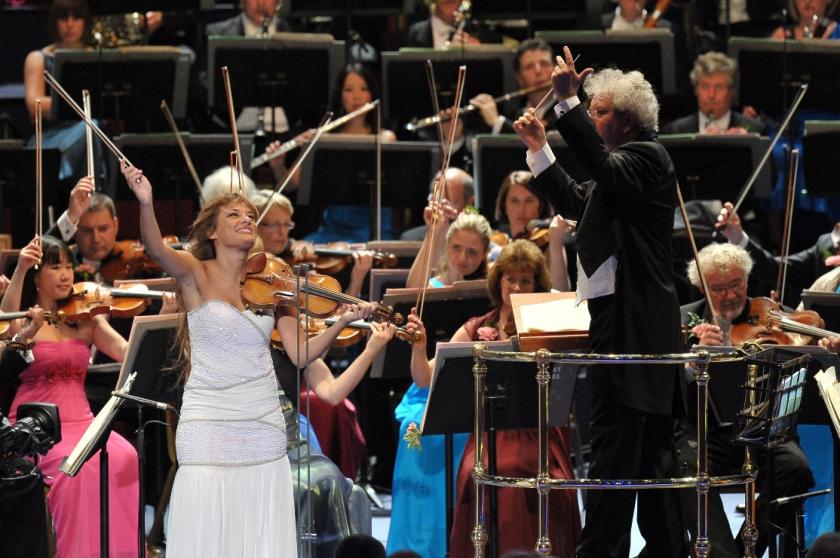The BBC Symphony Chorus did a mass Mobot. A posse of medal-winning rowers and sailors led the encore of Rule, Britannia. The Maltese tenor Joseph Calleja entered in Team GB trackies. It has been, we can probably agree, a summer unlike others we have known. Every year the Last Night of the Proms celebrates Britishness as if we’ve won a stack of golds and wowed the world, when mostly – these no longer being the 1890s - we haven’t. But for obvious reasons last night’s Last Night had the chance to put clear blue water between itself and the regular warm bath for jingoists. In the new dispensation, could this traditional finale pass without the curling of a single toe? As they say in the Olympic Park, it was a big ask.
The programme certainly kicked off in iconoclastic vein, with Mark Simpson’s Proms commission sparks offering riot and commotion, singing trombonists and horn players blowing air without mouthpieces. But it takes more than a musical explosion to blow the bloody doors off an institution’s more fossilised rituals, nowadays only slightly updated by the all-together-now singalong “You’ll Never Walk Alone”. As ever, the promming multitudes, self-coronated and beflagged, plastic-hatted and dicky-bowed, were on hand to let off whizzing balloons, parp witty klaxons and launch bouncing balls (Beecham volleyball, anyone?) while the usual brace of Prommers, who do somehow get up the nostrils despite all their vastly good works, were on hand to wipe the pate of Sir Henry Wood. But this year did somehow feel a little different.
 Why? Hard to say. It wasn’t just the cheerful acknowledgement that in Olympic year, Olympic music must be performed. Josef Suk’s anthem written for a musical competition in the 1932 Games, Towards a New Life, cheered on a Czechoslovak nation in a jolly state of self-renewal, while we were welcomed back from the interval by John Williams’ Olympic Fanfare and Theme for the Los Angeles Games of 1984, a brassy hallelujah embodying absolute essence of Spielberg: the sound of music that can make you believe. No wonder the serious half of the programme ended with the cheesiest quotation from the tenor’s repertoire, a heroic rendition of "Nessun dorma" which Calleja (pictured above right) delivered like someone's national anthem. That’s certainly how it was greeted.
Why? Hard to say. It wasn’t just the cheerful acknowledgement that in Olympic year, Olympic music must be performed. Josef Suk’s anthem written for a musical competition in the 1932 Games, Towards a New Life, cheered on a Czechoslovak nation in a jolly state of self-renewal, while we were welcomed back from the interval by John Williams’ Olympic Fanfare and Theme for the Los Angeles Games of 1984, a brassy hallelujah embodying absolute essence of Spielberg: the sound of music that can make you believe. No wonder the serious half of the programme ended with the cheesiest quotation from the tenor’s repertoire, a heroic rendition of "Nessun dorma" which Calleja (pictured above right) delivered like someone's national anthem. That’s certainly how it was greeted.
But it wasn’t all vincerò and fervour. A pall of melancholy was thrown over the first half by the final offering in this season’s exploration of Delius. Begun in 1920 and finished a decade later, Songs of Farewell was the composer’s Paralympian moment, composed when he was blind from (ahem) syphilis – and effortfully transcribed by his acolyte and amanuensis Eric Fenby. It sets to music five fragments by Whitman which movingly anticipate the last voyage of all. In the second part, “I stand as on some mighty eagle’s beak”, the BBC Symphony Orchestra and Chorus beautifully summoned the ocean main, while the fifth was a ravishing diminuendo to the last phrase: “Depart upon thy endless cruise, old sailor.”
 The old sailor who actually is departing is Jiří Bělohlávek CBE (pictured left). Absent from the Proms all summer due to illness, he was handsomely welcomed back and sent on his way with one last vibrant shot of Czech party music in the form of Dvořák’s Carnival Overture.
The old sailor who actually is departing is Jiří Bělohlávek CBE (pictured left). Absent from the Proms all summer due to illness, he was handsomely welcomed back and sent on his way with one last vibrant shot of Czech party music in the form of Dvořák’s Carnival Overture.
Nicola Benedetti, dressed like a gleaming white mermaid (later she switched to black, with red, white and blue), steamed through the Bruch violin concerto’s urgent outer movements but dazzled most of all in a spellbinding Adagio which finally persuaded the German coach party surrounding me to stop talking, taking snaps and filming, and listen. (That said, a muppet in a box chose this moment of deepest hush to drop their flute of fizz.) What they heard was melting passion and heartstopping ardour that underline how the Scottish violinist has hugely matured since she won BBC Young Musician of the Year in 2004. A brief shout-out for Nicholas Korth, the BBCSO principal horn who had two fleeting, velvety duets with Benedetti's violin, first in the Bruch and later in the woozy Romance from Shostakovich’s soundtrack to The Gadfly.
As ever with the Last Night’s guest larynx, it’s intriguing to hear how they will embrace a set of lyrics about sabre-rattling British conquistadores, especially one from a country with such a recent memory of colonial rule as Malta. To begin with Calleja, in a black frock coat and open-necked shirt, was very much the Mediterranean crooner in look and voice, all devastated ardour in Verdi’s “Forse la soglia attinse... Ma se m’è forza perderti” and Puccini’s “E lucevan le stelle”, followed in the second half by a grandstanding dose of Latin seduction with Leoncavallo’s “Mattinata” and Lara’s Granada. If he was self-conscious about singing of British triumph, even with a Maltese cross revealed under his Team GB tracksuit, it didn’t show half as much as on the faces of the Olympians and Paralympians invited out front for the encore (pictured below). Competition will have been much less terrifying.
So what if anything was different about this Last Night? Perhaps it was that for once the sentiment felt ever so slightly underpinned by substance. Yes, Wood’s Fantasia on British Sea Songs is sort of musically meaningless, but “Home, Sweet Home” - a little melodic hymn to where the (sometimes broken) heart is - was perhaps a little less saccharine in an evening whose theme was not just victory but valediction. Today, after all, the winning city says goodbye.
- Read theartsdesk's Proms coverage
- See portraits of Proms performers by photographer Chris Christodoulou on theartsdesk's Facebook page














Add comment